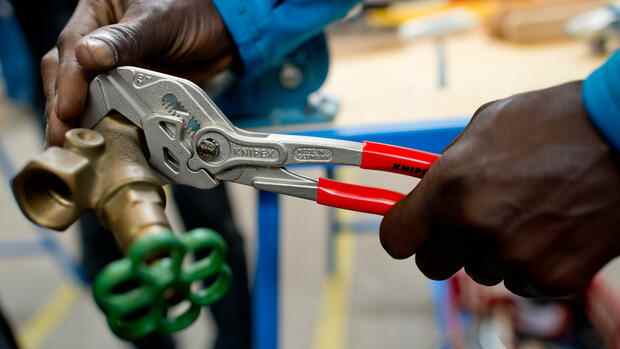Immigrants can help to solve the problem of skilled workers in the trades and other economic sectors.
(Photo: dpa)
Berlin The cornerstones for a planned reform of immigration law are to be adopted by the federal cabinet in October, if possible. The five ministries involved are largely in agreement, and he is optimistic that this will succeed, said State Secretary for Economic Affairs Sven Giegold (Greens) on Tuesday at an immigration congress organized by the Central Association of German Crafts (ZDH).
One of the key points will be that professional qualifications will no longer have to be recognized from abroad, but can be done in Germany. This is how the leading Federal Ministers of the Interior and Labor, Nancy Faeser and Hubertus Heil (both SPD), outlined it in a guest commentary for the Handelsblatt in July.
While German immigration law for highly qualified people has been one of the most liberal in industrialized countries for years, the complex recognition procedure for professional qualifications is actually “a key hurdle” for immigrants without an academic education, said Holger, Deputy Managing Director of the Advisory Council on Integration and Migration (SVR). Kolb, at the convention.
There should also be simplifications for family reunification
The traffic light coalition is determined to now remove such hurdles, which remained in place even after the immigration law for skilled workers passed by the grand coalition came into force in March 2020. However, Giegold also indicated that there are still different opinions within the federal government as to how far immigration law should be relaxed. Compared to the other ministries, his position as State Secretary for Economic Affairs was “by far the most liberal”, explained the Green politician.
Top jobs of the day
Find the best jobs now and
be notified by email.
Giegold also hinted that the government wants to tackle the “completely unrealistic salary thresholds” that some prospective immigrants have to jump if they want to work in Germany. It is also necessary to prevent skilled workers who have immigrated from migrating again – for example by facilitating the currently very restrictive family reunification.
The Migration and Diversity working group in the SPD is also campaigning for this, which would like to set priorities in immigration policy with its own proposals. Aziz Bozkurt, Berlin’s State Secretary for Education and national chairman of the working group, and Berlin lawyer Martin Menzel, who specializes in migration law, have developed a 24-page concept for this, which is now to be discussed more widely in the party.
>> Read the guest commentary by Ministers Nancy Faeser and Hubertus Heil here: How we can attract more foreign skilled workers
“A comprehensive immigration concept is required – because good immigration policy is more than just economic policy,” says the paper, which is available to the Handelsblatt. Anyone who wants skilled workers from abroad must therefore also think of their relatives and make it possible for them to join them. But a comprehensive integration concept is also necessary, since immigration does not end at the border.
Manzel and Bozkurt are also committed to facilitating the immigration of people who may not have had any theoretical training based on the German model, but who, thanks to years of experience, are well-versed practitioners. The Skilled Immigration Act only provides for the waiver of formal proof of qualification for IT specialists.
Craft calls for haste
The Western Balkans regulation also allows citizens from the Western Balkans who have a job offer from Germany to enter the country without lengthy proof of qualification.
Heribert Jöris, Managing Director of Social and Collective Bargaining Policy at the Central Association of the German Construction Industry (ZDB), called on politicians to leave it up to companies to decide which certificates of qualification they wanted to see from foreign applicants. And even if the cornerstones for a new immigration law went into the cabinet in October, no law would have been passed by a long shot.
The government should therefore also open up new immigration channels via the Employment Ordinance, which has so far been largely limited to executives, IT specialists, au pairs, seasonal workers or professional athletes.
There was agreement at the ZDH Congress that even the best immigration law is useless if the administrative procedures are not accelerated at the same time. With greater digitization of the administration, for example, the “legendarily long” waiting times in the visa offices could be shortened, said SVR Deputy Managing Director Kolb.
However, companies are also needed that are open to immigration and are willing to invest in skilled workers from abroad, emphasized Vanessa Ahuja, who is responsible for the immigration of skilled workers on the board of the Federal Employment Agency (BA).
She referred to the experience of the pilot project “Handwerk offers future” launched jointly by ZDH and BA, which supports companies in the Koblenz, Potsdam and Munich locations in the recruitment and integration of foreign workers. Although the companies hardly have to bear any costs, the interest is less than one had hoped, said Ahuja.
More: The immigration illusion – why more immigration won’t save us from labor shortages

